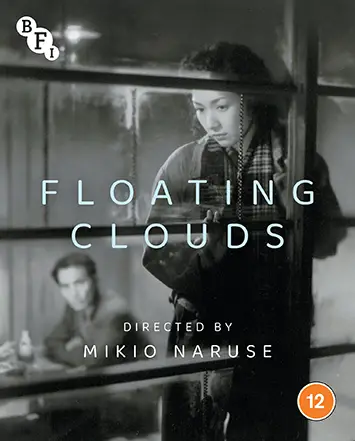Floating Clouds (1955) – Film Review

Director: Mikio Naruse
Cast: Hideko Takamine, Masayuki Mori, Mariko Okada
Certificate: 12
By Sarah Morgan
Despite seemingly spending most of my life glued to a screen watching films, there are still some glaring gaps in my knowledge about certain national cinemas and their auteurs.
 Certainly, when it comes to Japan, beyond Akira Kurosawa and Yasujiro Ozu, I’m rather ignorant. So, when the chance to review Floating Clouds came along, I grabbed it with both hands. It’s one of the key works on the CV of Mikio Naruse, who is best known for making shoshimin-eiga, or ‘common people films’. Think Japanese versions of kitchen sink drama, and you get the picture.
Certainly, when it comes to Japan, beyond Akira Kurosawa and Yasujiro Ozu, I’m rather ignorant. So, when the chance to review Floating Clouds came along, I grabbed it with both hands. It’s one of the key works on the CV of Mikio Naruse, who is best known for making shoshimin-eiga, or ‘common people films’. Think Japanese versions of kitchen sink drama, and you get the picture.
His movies often feature bleak or pessimistic storylines, and that’s definitely the case here.
“A beaten nation”
One of Naruse’s favourite leading ladies, Hideko Takamine, plays Yukiko. The story, based on a novel by Fumiko Hayashi, takes place shortly after the end of the Second World War, with Japan, a beaten nation, in a depressed state.
Yukiko spent the conflict in French Indochina, working on a forestry project for the Japanese government. On her expatriation, she doesn’t return to her hometown, but heads for Tokyo, where she hopes to be reunited with Kengo (Masayuko Mori), the married lover who promised to leave his wife for her.
Unfortunately, he claims his wife is ill and therefore he can’t abandon her. They nevertheless resume their affair, while other men enter her life from time to time, and he takes a younger lover.
Eventually, Yukiko falls pregnant and has an abortion. Fate also intervenes at a key moment – can they really live happily ever after?
The aforementioned Ozu apparently proclaimed Floating Clouds ‘a masterpiece’ in his diaries, and it cannot be denied that although lowkey, it’s a powerful tale. I did, however, find its relentlessly bleak plot a little too much to bear at times.

“Hopeless view of love”
Takamine is brilliant as Yukiko, an intelligent woman who nevertheless can’t move on with her life, even though it’s clear a fresh start would be the sensible turn to take; Naruse offers a hopeless view of love, one in sharp contrast to many of the upbeat movies coming out of Hollywood at the time.
The film also delivers an interesting look at Japan during the post-war period, as its once-successful citizens struggle to get a foothold in a new world.
Special features include a feature-length assessment of Naruse’s career, which is essential to anyone unfamiliar with his work. An interview from 2007 with Japanese film expert Freda Freiberg also deserves attention.
Special features:
- Newly restored and presented in High Definition
- Newly recorded audio commentary by writer and film critic Adrian Martin
- Mikio Naruse: Auteur as Salaryman (2016, 73 mins, audio): academic Catherine Russell, an expert in the cinema of Naruse, assesses the director’s career. Recorded at BFI Southbank
- Freda Freiberg on Floating Clouds (2007, 10 mins)
- Paul Willemen on Floating Clouds (2007, 7 mins)
- Floating Clouds selected scenes commentary (2007, 10 mins): cinema historian Freda Freiberg examines a key sequence from Floating Clouds
- First pressing only - Illustrated booklet with a new writing on the film by Catherine Russell, previously published essays by Adrian Martin and Freda Freiberg, notes on the special features and credits
Floating Clouds is released on Blu-ray by BFI








